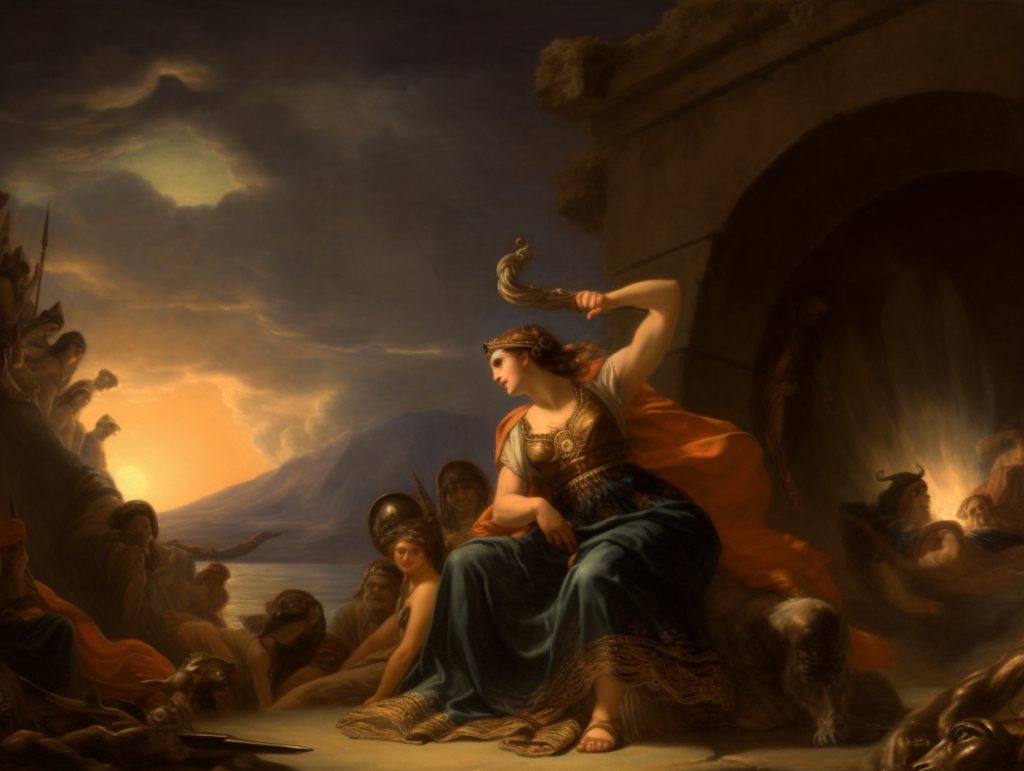Are you ready to delve into the tragic tale of Cassandra in Greek myths?
Brace yourself for a story of prophecy, curses, love, betrayal, and desperate warnings.
Cassandra’s role in the fall of Troy and her ultimate fate will captivate you.
Join us as we explore the legacy of this ill-fated figure, whose tragic tale continues to resonate throughout the ages.
Key Takeaways
- Cassandra was a Trojan princess gifted with the power of prophecy, but her prophecies were not believed due to a curse placed on her by Apollo when she rejected his advances.
- Cassandra’s ill-fated relationships with her brother Paris, Apollo, and Agamemnon led to her tragic downfall and eventual death at the hands of Clytemnestra.
- Despite Cassandra’s desperate warnings about the fall of Troy and the danger of the Trojan Horse, her pleas for caution were dismissed and ignored, leading to the destruction of Troy and the loss of many lives.
- Cassandra’s tragic fate and legacy serve as a cautionary tale about the consequences of ignoring warnings and dismissing the insights of others. Her story highlights the importance of listening to the truth and the dangers of not heeding prophecy.
Cassandra’s Prophecy and the Curse of Apollo
You’ll be amazed at the extent of Cassandra’s prophecy and the devastating curse placed upon her by Apollo.
Cassandra, the daughter of King Priam and Queen Hecuba of Troy, was blessed with the gift of prophecy by the god Apollo. However, when she rejected his advances, Apollo cursed her. From that moment onwards, Cassandra’s prophecies would always be accurate, but no one would believe her. This curse brought immense tragedy upon her and the people around her.
Cassandra’s prophecies were incredibly accurate and warned of the impending doom that would befall Troy. She foresaw the Trojan War and the destruction of her beloved city, yet her warnings fell on deaf ears. Despite her desperate pleas, the Trojans dismissed her prophecies as madness or divine punishment. This led to their downfall and the eventual destruction of Troy.
The curse of Apollo not only caused Cassandra’s prophecies to be disregarded but also brought her personal suffering. She was seen as a madwoman and was often mocked and ridiculed. Her life became a constant struggle, as she witnessed the tragedies that she’d foreseen unfold before her eyes, unable to change their course.
Cassandra’s prophecy and the curse placed upon her by Apollo serve as a tragic reminder of the consequences of defying the gods and the powerlessness of even the most gifted individuals in the face of fate.
Love and Betrayal: Cassandra’s Ill-Fated Relationships
Experiencing both love and betrayal, Cassandra’s ill-fated relationships ultimately led to her tragic downfall. Despite her gift of prophecy, Cassandra was cursed by Apollo, making her prophecies fall on deaf ears. But it wasn’t just her prophetic abilities that brought her misery; it was also the people she loved and trusted.
Here are three heart-wrenching examples of love and betrayal in Cassandra’s life:
- Paris: Cassandra’s own brother, Paris, betrayed her when he chose Helen of Troy over his own family. Despite Cassandra’s warnings about the disastrous consequences of his actions, Paris disregarded her words and set in motion the events that would lead to the Trojan War. Cassandra’s love for her brother was overshadowed by his betrayal, leaving her heartbroken and alone.
- Agamemnon: When Cassandra was taken as a concubine by Agamemnon, she fell in love with him. However, their relationship was built on deceit and manipulation. Agamemnon used Cassandra as a pawn in his power struggle, ultimately sacrificing her life for his own gain. The love Cassandra felt for Agamemnon was cruelly exploited, leaving her with a sense of profound betrayal.
- Apollo: Though not a romantic relationship, Cassandra had a connection with Apollo, the god who cursed her with the gift of prophecy. Despite their association, Apollo betrayed Cassandra by cursing her prophecies to be disbelieved. The god she thought she could trust turned against her, leaving her isolated and tormented.
These tragic relationships, filled with love and betrayal, played a significant role in Cassandra’s ultimate downfall. The pain and anguish she experienced from those closest to her left her with a tragic fate that she could never escape.
Cassandra’s Desperate Warnings and the Ignorance of Others
Despite Cassandra’s desperate warnings, many others ignored her, and tragedy ensued. Throughout Greek mythology, Cassandra’s ability to prophesy the future accurately was a gift that proved to be both a blessing and a curse. She foresaw the fall of Troy, the death of her family, and even her own tragic fate. However, despite her desperate attempts to warn others and avert disaster, Cassandra’s words fell on deaf ears.
In a world where the gods and their prophecies were revered, it is baffling to comprehend the ignorance of those who dismissed Cassandra’s warnings. She stood before the people, her voice filled with urgency, desperately trying to save them from the impending doom. But they chose to ignore her, believing her to be nothing more than a madwoman.
To illustrate the tragic consequences of this ignorance, let us delve into the minds of the characters involved in the story. The following table highlights Cassandra’s warnings and the responses she received:
| Cassandra’s Warning | Ignorance of Others |
|---|---|
| Troy will fall | Laughter |
| Death awaits us | Disbelief |
| Beware of Greeks | Mockery |
| You will perish | Ridicule |
| Tragedy is coming | Indifference |
Looking at this table, one cannot help but feel the frustration and despair that Cassandra must have experienced. Her desperate pleas for caution were met with laughter, disbelief, mockery, ridicule, and indifference. It is a tragic reminder of the consequences that can arise when important warnings go unheeded.
Cassandra’s story serves as a cautionary tale, reminding us of the importance of listening to those who possess valuable knowledge and insight. It is a stark reminder that ignorance can have devastating consequences, and that sometimes, tragedy could have been averted if only we had chosen to heed the warnings of the Cassandra’s in our lives.
The Fall of Troy: Cassandra’s Tragic Role in the Trojan War
Cassandra witnessed the fall of Troy, and yet she was unable to prevent the tragedy that unfolded. As the city burned and the sounds of chaos filled the air, she stood among the ruins, her heart heavy with sorrow. Here is a list of the heartbreaking events that unfolded:
- The merciless slaughter of innocent lives.
- The destruction of a once magnificent city.
- The loss of loved ones and the agony of separation.
Cassandra’s visions had foretold this devastation, but her words had fallen on deaf ears. The curse that Apollo had placed upon her ensured that no one would believe her prophecies. And so, she watched in despair as her warnings went unheeded and the people she loved perished.
Yet, amidst the ruins and the despair, Cassandra’s spirit remained unbroken. She’d fought tirelessly to save her city, and though she’d failed, her courage and unwavering determination weren’t forgotten.
And so, we delve further into the tragic tale of Cassandra, exploring the final tragedy that befell her, and the enduring legacy she left behind.
The Final Tragedy: Cassandra’s Fate and Legacy
Unfortunately, you may be surprised to learn that despite her valiant efforts, Cassandra’s fate took a tragic turn, and her legacy would forever be defined by her unheeded prophecies.
After the fall of Troy, Cassandra was taken as a war prize by Agamemnon, the Greek king who led the assault on the city. However, her tragic fate didn’t end there. In some versions of the myth, Cassandra was killed by Clytemnestra, Agamemnon’s wife, as an act of revenge for her own betrayal. Others believe that Cassandra was taken by Clytemnestra as a slave and later killed by her children. Regardless of the exact details, it’s clear that Cassandra met a tragic end at the hands of those she tried to warn.
Despite her tragic fate, Cassandra’s legacy as a prophetess lived on. Her unheeded prophecies became a cautionary tale, reminding people of the consequences of ignoring divine messages. Her name became synonymous with being cursed with the gift of foresight but being powerless to change the course of events.
Throughout history, storytellers and writers have used Cassandra’s story to explore themes of fate, destiny, and the limitations of human agency. Her tragic fate and legacy serve as a reminder that sometimes, even the most powerful of warnings can go unheard.
Frequently Asked Questions
What Is the Origin of Cassandra’s Prophecy and the Curse of Apollo?
The origin of Cassandra’s prophecy and the curse of Apollo is rooted in Greek mythology. Apollo fell in love with her and granted her the gift of prophecy, but when she rejected him, he cursed her so that no one would believe her predictions.
How Does Cassandra’s Ill-Fated Relationships Contribute to Her Tragic Tale?
You can see how Cassandra’s ill-fated relationships contribute to her tragic tale. Her doomed love affairs and the betrayal she faces from those closest to her only add to the sorrow of her story.
What Were Some of the Desperate Warnings Given by Cassandra and Who Ignored Them?
Some of the desperate warnings given by Cassandra were ignored by those who should have listened. She tried to save them from their fate, but they turned a deaf ear to her words.
How Did Cassandra’s Role in the Fall of Troy Ultimately Lead to Her Tragedy?
Cassandra’s role in the fall of Troy ultimately led to her tragedy because her warnings were ignored. She foresaw the city’s destruction but no one believed her, causing her to suffer a tragic fate.
What Is the Legacy of Cassandra and How Is She Remembered in Greek Mythology?
In Greek mythology, Cassandra’s legacy is one of tragedy and foresight. She is remembered as the cursed prophetess who was never believed, her warnings ignored until it was too late.







